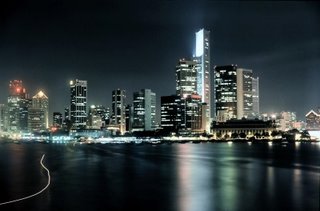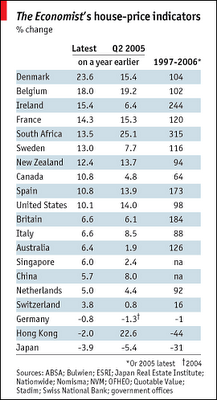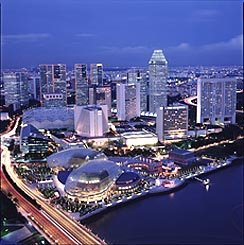singapore / bubble world tour
the rest of the stops here:
http://immobilienblasen.blogspot.com/2006/09/bubble-goes-global.html
nicht wirklich überraschend. bemerkenswert ist hier das die preise noch 33% unter dem peak von 1996 sind. zudem ist das wirtscahftswachstum in singapur sicher eines der hächsten und das land in einer sehr guten verfassung. möchte also singapur noch nicht in eine linie mit den anderen bubbles stecken. allerdings tut die regierung gerade alles um das zu ändern.

Singapore Luxury Homes Prices Reach Records on Economy, Taxes
http://www.bloomberg.com/apps/news?pid=20601109&sid=a1nd81sHs6Bw&refer=home
highlights:
Sept. 12 (Bloomberg) -- Mark Edleson, a former Citigroup Inc. vice president, needed a waterfall to persuade his wife to quit their estate outside Jakarta and move to Singapore. He found it inside a $2.9 million, marble-floored apartment.
The market for Singapore's luxury homes -- those costing more than about S$1,500 ($953) per square foot -- is on a roll as the $118 billion economy has its longest expansion in five years. Prices are rising to match gains of as much as 42 percent in Bangkok, Hong Kong and Shanghai in the past two years, as new tax breaks and ownership rules lure overseas wealth
Bidders for luxury digs such as Edleson's -- with 3,300 square feet (307 square meters) of living space set in a tropical garden -- have driven home purchase costs to records this year. Developer Kwek Leng Beng forecasts a further 10 percent to 20 percent increase in 2006
``We're just at the beginning of an upward trend,'' said billionaire Kwek, 65, chairman of City Developments Ltd., Singapore's second-largest property company. ``That's not just a possibility, that's a probability

Singapore buyers are paying 11 percent more for the most expensive homes in the past two years, according to property broker Jones Lang LaSalle Inc.
In June, a City Development apartment with South American hardwood floors sold for a record of more than S$3,000 (1900 us$, 1500 €)per square foot, the company said without disclosing the total.
The gain was about 8 percent, to S$1,670 per square foot on average, in the second quarter this year from the first three months, CB Richard Ellis said. Joseph Tan, the company's director of residential services in Singapore, forecasts a further 20 percent increase.
The surge is powered by new tax laws designed to lure wealth to the city-state's private banking industry and an easing of home-ownership curbs, especially for non-natives.
The government exempted domestic and overseas investments from capital gains tax in 2004. Singapore's private banks now manage $200 billion, according to the central bank, with about 70 percent of funds coming from abroad.
``In private banking, the next big wave will be Indians and Chinese, and they will buy apartments,'' said Francis Yeoh, managing director of YTL Corp., Malaysia's biggest builder. ``Singapore properties will not come down, especially high end.''

The government also included property last year in the S$2 million that overseas investors must hold in Singapore to apply for residency. In addition, it permitted non-Singaporeans to buy apartments in buildings with fewer than seven stories without seeking government approval.
Development is booming. Eight publicly traded property companies and their units raised S$5 billion from equity and debt investors in the first half of 2006, almost three times the amount raised in the same period in 2005, according to data compiled by Bloomberg.
Shares of CapitaLand Ltd., Singapore's largest developer, have risen 61 percent in the past 12 months. SC Global stock has gained 72 percent and City Developments is up 5 percent.
Winston Liew, a property analyst at OCBC Investment Research Pte. in Singapore, cautions that the boom may not last. Developers buying older apartments, known as en-bloc purchases, risk overbuilding, Liew said.
``The reason there are so many en-blocs is the perception that the appreciation in the high-end prices is sustainable,'' Liew said. ``This hot money could potentially disappear.''
Even so, home prices are 33 percent off their peak, government data shows. Prices started falling in mid-1996 when the government moved to curb speculation by taxing as much as 100 percent of profit from the immediate sale of residential property.
Las Vegas Sands Corp.'s planned $3.6 billion casino-resort for Singapore, which is due to open in 2009, also may drive prices higher. Bids for a second casino are due next month.
jan-martin
![[Most Recent Quotes from www.kitco.com]](http://www.kitconet.com/charts/metals/gold/t24_au_en_usoz_2.gif)
![[Most Recent Quotes from www.kitco.com]](http://www.kitconet.com/charts/metals/gold/t24_au_en_euoz_2.gif)

0 Comments:
Post a Comment
<< Home